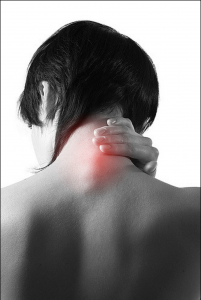Neck pain is a common complaint across the country, and is particularly prevalent among those who work in sedentary conditions. Most of the time, neck pain is temporary and is not a cause for alarm. However, when pain continues for an extended period of time, or you find yourself unable to find relief, it is prudent seek the services of a pain management professional. This is especially the case if numbness or loss of strength in the arms or hands, or shooting pain in the shoulder or down the arm occur. Living with pain can not only negatively impact quality of life, but can also exacerbate the condition through feedback loops in the nervous system.

Neck pain can be acute or chronic, mild to severe, and widespread or isolated. It may result from a number of causes that span the interconnected neurological, musculoskeletal, and vascular systems. Pain neurotransmitters may be released when nerves are stimulated by trauma or pressure, when muscles are strained, when joints are pressured or damaged, or when the surrounding tissues are inflamed. Stress, as in many conditions, can contribute to and exacerbate neck pain.

Maintaining an overall healthy lifestyle helps to reduce the risks for many medical conditions, including neck pain. A healthy diet and abstinence from smoking can help to reduce risks that contribute to neck pain. A sensible exercise regime can help to strengthen the muscles that support the neck in daily life, but also in cases of traumatic accidents. Resting and caring the neck when experiencing limited mobility, stiffness, or pain can help to prevent further injury. Finally, the maintenance of good posture when standing, walking, sitting, and lying down is paramount. Adjust the height of your chair or monitor to reduce the likelihood of straining when using the computer, take frequent breaks when working at a desk to stand and stretch, and ensure that your head and neck are adequately supported when in bed.
Treatment begins with a thorough diagnosis by a specialist, using a number of diagnostic tools. Because neck pain can have a multitude of causes, it is important to rule out any underlying trauma or disease. If there are signs of trauma, then the patient is instructed on how to care for the neck while the body repairs. Inflammation may be treated with oral or injectable anti-inflammatory medication, muscle spasms can be treated with oral medication or neurotoxin injections, and nerve pain can be treated with joint blocks and other procedures. A number of treatment options exist, and a pain specialist ought to create an individualized treatment plan for the patient.
The pain management specialists at Cayman Neurology and Pain Management use a holistic approach where all potential modalities to alleviate pain are incorporated into a treatment plan throughout a patient’s life. Any changes to patients’ symptoms will be addressed on an ongoing basis. Integrating lifestyle changes with a range of treatment options allows the patient to minimize degeneration and lay the ground for improvement.
For additional information on the treatment options for neck pain, contact Cayman Neurology and Pain Management. If you would like to schedule an appointment or check for availability, please book online or call+1 345-943-6900.
Copyright © 2024 Cayman Neurologist. All Rights Reserved.